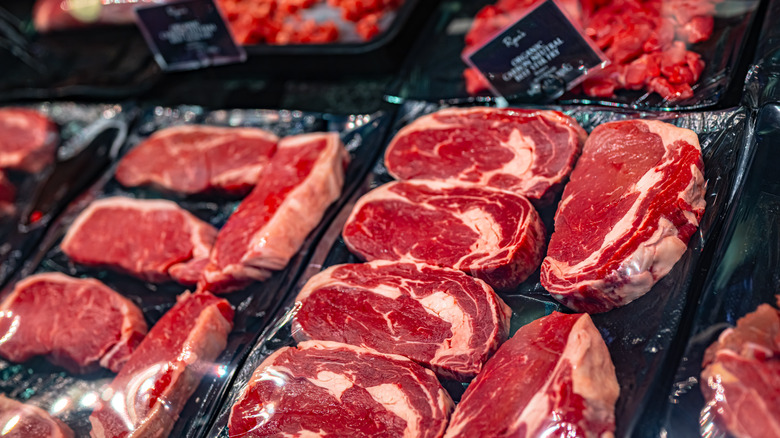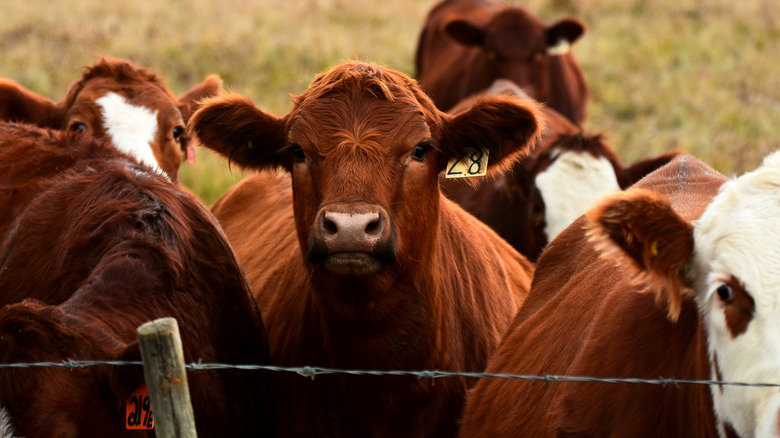The Real Reason Beef Prices Are At An All Time High
Beef: it might not be what's for dinner. Beef prices have been on the rise, along with the rest of grocery prices. Prices for beef have been steadily climbing since 2020, and have broken records all throughout summer 2025. In fact, the price of ground beef is now 51% higher than it was in February 2020 — pre-pandemic. As a result, restaurants and grocery stores have been marking prices up on items like burgers, brisket, and all cuts of beef. For example, a burger that might have cost $8.95 pre-pandemic now sells for $11.95 or more. However, price gouging isn't entirely the reason for these spikes.
Beef prices are largely up because cattle numbers are down. Drought, disease, and slow repopulation have led to herds that are thinner than ever in 2025. This, combined with how tariffs on foreign goods are limiting imported competition, has created ongoing supply-and-demand fueled price hikes on beef. Of course, cattle ranchers aren't exactly hurting from these lesser herds, as they have the only stock to sell in a very narrow field and are therefore able to profit most from scarcity. "We've kind of hit this perfect storm," Brady Blackett, a Utah-based Angus cattle producer, told NPR. "There's healthy competition for the cattle, and there's not enough of them to fulfill the demand. And so it has driven prices to historic highs." Unfortunately, these highs are driving business owners to raise prices high enough that some shoppers might wand to consider skipping red meat altogether.
The beef and cattle trade have had a rough few years
Beef and the cattle trade in North America has been interdependent for decades. However, in recent years, heat and drought have helped shrink United States cattle herds. The early days of the COVID-19 pandemic didn't help, when thousands of cattle plant workers were sickened and plant operations were impacted, causing U.S. cattle stock to hit its lowest point since 1951. Still, even as staff returned to work in production, inflation and fuel prices continued to rise alongside the cost to feed and cool the animals. The smaller resulting cattle destined for the feedlot became leaner and less profitable. However, losses and costs during this time meant that growing herds was out of the question for most ranchers. In fact, in 2022, many ranchers sold off their herds entirely.
As a result, beef production continues to decline. "Some people got tired of the hassle and got out of the business," Lisa Roberts, a rancher, said to The Wall Street Journal in 2023. "For the average cattle raiser, it's a break-even business" While that business has historically motivated ranchers to keep attempting to meet U.S. demand for beef, in recent years many have called it quits instead. Plus, President Trump's tariffs, as well as retaliatory tariffs, have further shifted the trade's nature by stoking tension between U.S. trading partners Canada and Mexico. With limited supply to meet strong demand, U.S. cattle ranchers are now poised to be more profitable than eve, with cattle now selling for a profit of $700 a head, compared to a $2 profit in 2020.
Beef's future might get even more controversial
In the game of supply and demand, whoever has the most demanded-for supply tends to hold the power — and profit. While sometimes demands shifts, for years costs and even health consciousness have failed to drive down demand for beef. There will likely always be people hunting for the grocery store that sells the cheapest ground beef or even getting creative at Costco by ordering a beef "chub." But as beef prices continue to skyrocket, some people are switching to alternatives. For instance, pork production continues to increase, likely as consumers are switching to cheaper meats during their grocery trips. Beef may instead become a special occasion food for celebrations, rather than a more regular steak-and-potatoes meal.
Trump has taken to Truth Social to demand U.S. cattle ranchers lower their prices, saying they are doing better than that have in years due to tariffs he's placed on Brazilian beef imports. However, Trump also angered U.S. ranchers by importing more low-tariff beef from Argentina instead, despite cattle workers and some Republicans speaking out against the idea in late October 2025. "A deal of this magnitude with Argentina would undercut the very foundation of our cattle industry," says Justin Tupper, president of the United States Cattlemen's Association (USCA) in a statement. "Flooding the market with imports would undermine U.S. cattle producers, drive down prices for family ranchers, and weaken the fabric of rural America. Our policies should strengthen American agriculture—not put it at greater risk."


